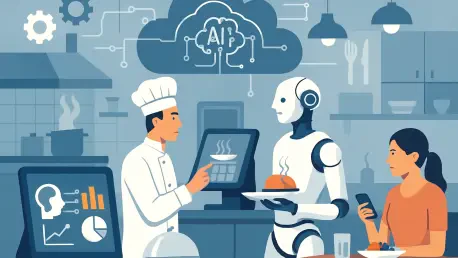In an era where the restaurant industry faces unprecedented challenges like persistent labor shortages, shifting customer preferences, and the constant demand for efficiency, a new wave of technology is emerging as a powerful ally. Artificial Intelligence (AI) agents, sophisticated software systems rather than physical robots, are stepping into the fray to transform how restaurants operate on a daily basis. These tools are designed to handle repetitive, time-consuming tasks with remarkable precision, allowing staff to focus on delivering exceptional guest experiences. From managing phone reservations to optimizing inventory, AI is not merely a futuristic concept but a practical solution addressing real-world problems in hospitality. This technological shift is redefining operational workflows, enhancing customer interactions, and ensuring that the human touch remains at the core of dining, even as automation becomes more prevalent. As restaurants navigate a complex landscape, AI agents are proving to be indispensable tools for survival and growth in a competitive market.
Tackling Operational Pain Points with AI
The daily grind of restaurant operations often involves juggling numerous tasks that can overwhelm even the most seasoned teams, especially in an environment marked by staffing constraints. AI agents are stepping up as vital solutions, particularly in managing high-volume, repetitive duties that drain time and resources. For instance, automated phone answering systems handle reservation inquiries and customer questions with speed and accuracy, ensuring no call is missed. This capability is a lifeline for understaffed establishments where every minute counts, allowing employees to redirect their focus toward in-person guest interactions. By taking over such logistical burdens, AI helps maintain service quality without requiring additional hires, addressing one of the most pressing issues in the industry today. The impact is clear: restaurants can operate more smoothly, even under pressure, with technology acting as an invisible yet powerful assistant.
Beyond communication, AI is making significant strides in streamlining back-of-house functions that are often prone to human error and inefficiency. Inventory management, a critical yet tedious aspect of running a restaurant, benefits immensely from AI’s ability to monitor stock levels in real time, predict needs based on historical data, and minimize waste. Similarly, staff scheduling tools powered by AI analyze patterns to allocate shifts effectively, preventing overstaffing during slow periods or understaffing during peak times. These advancements translate into tangible cost savings and operational stability, as errors in ordering or labor allocation are drastically reduced. Importantly, such tools are often intuitive, requiring minimal training, which means even smaller establishments can adopt them without a steep learning curve. This democratization of technology ensures that efficiency is within reach for a wide range of businesses, reshaping how resources are managed across the sector.
Elevating the Guest Experience Through Technology
On the customer-facing front, AI agents are quietly revolutionizing how diners interact with restaurants, enhancing convenience without sacrificing the personal warmth that defines hospitality. Automated check-in kiosks, for example, are becoming a common sight, allowing guests to bypass long waits at the host stand and be seated more quickly. This not only improves the flow of service but also leaves a positive first impression, setting the tone for the entire dining experience. Additionally, AI-driven communication tools enable personalized follow-ups, such as thank-you messages or feedback requests, which help build stronger relationships with patrons. These small but meaningful touches demonstrate how technology can amplify customer satisfaction, ensuring guests feel valued even as automation handles the logistics behind the scenes.
What sets AI apart in this context is its ability to support rather than supplant human interaction, striking a delicate balance that preserves the essence of hospitality. By offloading routine tasks like reservation management or initial customer queries, AI frees up staff to engage more deeply with diners, offering tailored recommendations or addressing unique needs with empathy and creativity. This synergy ensures that technology enhances the dining experience rather than making it feel cold or impersonal. Guests benefit from faster, more accurate service, while employees can dedicate their energy to crafting memorable moments that keep customers coming back. As a result, restaurants adopting these tools are finding that efficiency and genuine connection are not mutually exclusive but can coexist to create a superior level of service that stands out in a crowded market.
Shaping the Future of Dining with Smart Solutions
The increasing integration of AI into restaurant operations signals a broader shift in hospitality, where technology is no longer seen as an optional luxury but as a fundamental component of success. User-friendly tools like automated phone systems and scheduling software are designed for quick implementation, delivering immediate benefits even to businesses with limited tech expertise. Their accessibility means that establishments of all sizes, from small family-run diners to large urban chains, can leverage AI to address specific pain points. This widespread adoption is fueled by the urgent need to adapt to evolving industry challenges, ensuring that restaurants remain competitive while maintaining high standards of service. The trend underscores a pivotal reality: embracing AI is becoming essential for staying relevant in a fast-paced, resource-constrained environment.
Looking ahead, the potential for AI in hospitality appears boundless, with innovations poised to deepen their impact on how restaurants function and connect with their audiences. As these systems grow more advanced, they are expected to offer even greater customization, aligning seamlessly with a restaurant’s unique brand voice or operational needs. Integration with other systems, such as payroll or customer relationship platforms, will likely become more robust, creating a cohesive ecosystem that simplifies management tasks. This adaptability promises to keep AI at the forefront of industry transformation, paving the way for smarter, more responsive dining environments. Reflecting on the journey so far, it’s evident that AI agents have already reshaped operational efficiency and guest engagement in profound ways, setting a strong foundation for future advancements that will continue to redefine what hospitality can achieve.









